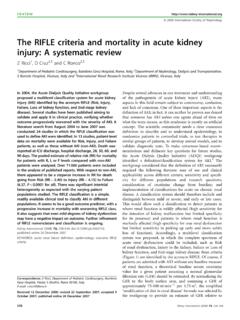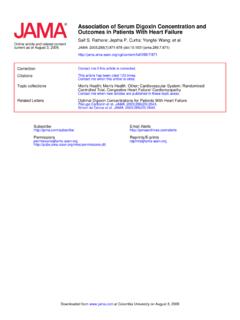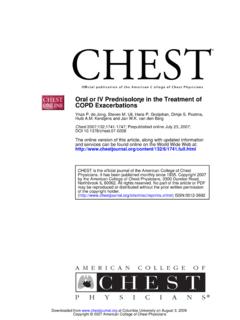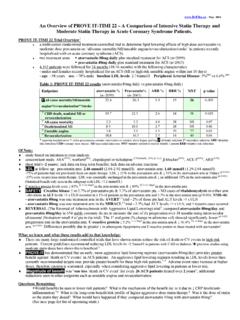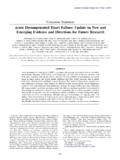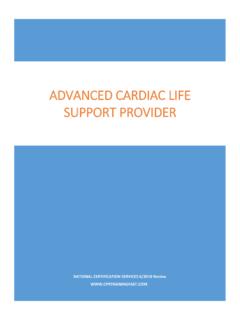Transcription of Platelet glycoprotein IIb/IIIa inhibitors in acute ...
1 ARTICLES. Articles Platelet glycoprotein IIb/IIIa inhibitors in acute coronary syndromes: a meta-analysis of all major randomised clinical trials Eric Boersma, Robert A Harrington, David J Moliterno, Harvey White, Pierre Th roux, Frans Van de Werf, Anneke de Torbal, Paul W Armstrong, Lars C Wallentin, Robert G Wilcox, John Simes, Robert M Califf, Eric J Topol, Maarten L Simoons Summary concentrations. Major bleeding complications were increased by glycoprotein IIb/IIIa inhibitors (2 4% [445/18 297] vs 1 4%.)
2 Background Platelet glycoprotein IIb/IIIa inhibitors have been [180/13 105]; p<0 0001), but intracranial bleeding was not shown to reduce cardiac complications in patients undergoing (16 [0 09%] vs 8 [0 06%]; p=0 40). percutaneous coronary intervention. The clinical efficacy of these drugs in acute coronary syndromes, however, is still Interpretation glycoprotein IIb/IIIa inhibitors reduce the unclear. We did a meta-analysis of all large randomised trials occurrence of death or myocardial infarction in patients with designed to study the clinical efficacy and safety of glycoprotein acute coronary syndromes not routinely scheduled for early IIb/IIIa inhibitors in patients with acute coronary syndromes revascularisation.
3 The event reduction is greatest in patients at who were not routinely scheduled to undergo early coronary high risk of thrombotic complications. Treatment with a revascularisation. glycoprotein IIb/IIIa inhibitor might therefore be considered especially in such patients early after admission, and Methods Inclusion criteria were: randomisation of patients with continued until a decision about early coronary acute coronary syndromes but without persistent ST elevation; revascularisation has been made. comparison of a glycoprotein IIb/IIIa inhibitor with placebo or control therapy; non-recommendation of early coronary Lancet 2002; 359: 189 98.
4 Revascularisation during study-drug infusion; and enrolment of at least 1000 patients. Data on individual patients were Introduction obtained from all participants in these trials. Disruption of atherosclerotic plaque, which either occurs spontaneously in patients with acute coronary syndromes or Findings Six trials, enrolling 31 402 patients, fulfilled the during a percutaneous coronary intervention (PCI), triggers inclusion criteria. 30 days after randomisation, 3530 (11 2%) Platelet aggregation and intracoronary thrombus formation, patients died or developed a myocardial infarction.
5 At 30 days, and can result in myocardial infarction or death. Activation a 9% reduction in the odds of death or myocardial infarction of the Platelet glycoprotein IIb/IIIa receptor is the final was seen with glycoprotein IIb/IIIa inhibitors compared with common pathway in the process leading to Platelet placebo or control (10 8% [1980/18 297] vs 11 8% aggregation, and inhibitors of this receptor have been shown [1550/13 105] events; odds ratio 0 91 [95% CI 0 84 0 98]; to protect against periprocedural death or myocardial p=0 015).
6 The relative treatment benefit was similar in infarction in patients undergoing PCI for various subgroups of patients according to important clinical baseline 4. characteristics; hence, the absolute treatment benefit was Randomised clinical trials have indicated that largest in high-risk patients. An unexpected and significant glycoprotein IIb/IIIa inhibitors reduce the occurrence of interaction was seen between sex and allocated treatment, these events by 38% compared with placebo or control with a treatment benefit in men (0 81 [0 75 0 89] but not in ,6 However, the results of trials in acute coronary women (1 15 [1 01 1 30]).)
7 However, once patients were syndromes in which coronary revascularisation during stratified according to troponin concentration, there was no study-drug infusion was not part of the protocol, have been evidence of a sex difference in treatment response, and a risk less conclusive. glycoprotein IIb/IIIa inhibitors did reduce reduction was seen in men and women with raised troponin cardiac endpoints in most of these trials,7 11 but not in In the trials with a positive trend, the event University Hospital Rotterdam, Rotterdam, Netherlands reduction was often lower than expected, and significance (E Boersma PhD, A de Torbal MSc, Prof M L Simoons MD); Duke was not always reached.
8 In fact, most trials in acute Clinical Research Institute, Durham, NC, USA (R A Harrington MD, coronary syndromes were powered for the detection Prof R M Califf MD); Cleveland Clinic Foundation, Cleveland, OH, of a large treatment effect (>20% risk reduction), but USA (D J Moliterno MD, Prof E J Topol MD); Green Lane Hospital, were underpowered for more modest, but potentially Auckland, New Zealand (Prof H White MD); Montreal Heart Institute, clinically important, effects. In this situation, a meta- Montreal, Canada (Prof P Th roux MD); University Hospital Leuven, analysis of the combined trial data can be useful to Leuven, Belgium (Prof F van de Werf MD); University of Alberta, estimate more reliably the overall effect of glycoprotein Edmonton, Canada (Prof P W Armstrong MD); University Hospital IIb/IIIa inhibitors .
9 If based on data from individual Uppsala, Uppsala, Sweden (Prof L C Wallentin MD); Queen's Medical patients, such meta-analyses can also provide reliable Centre, Nottingham, UK (Prof R G Wilcox MD); and University of estimates of treatment effects in clinically meaningful Sydney, Australia (Prof J Simes MD) subgroups of In case of an overall beneficial Correspondence to: Dr Eric Boersma, University Hospital Rotterdam, effect, analysis of subgroups can help identify the target Department of Cardiology, Room H543, Dr Molewaterplein 40, population to be treated preferentially.
10 We did a meta- 3015 GD Rotterdam, Netherlands analysis of all large randomised trials designed to study (e-mail: the clinical efficacy and safety of glycoprotein IIb/IIIa THE LANCET Vol 359 January 19, 2002 189. For personal use. Only reproduce with permission from The Lancet Publishing Group. ARTICLES. PRISM7 PRISM-PLUS8 PARAGON-A9 PURSUIT10 PARAGON-B11 GUSTO-IV ACS12. Enrolment period 1994 96 1994 96 1995 96 1995 97 1998 99 1998 2000. Number of patients 3232 1915 2282 10 948 5225 7800. Last episode of chest 24 h 12 h 12 h 24 h 12 h 24h pain Indicator of myocardial ischaemia ST depression or 1 0 mm 1 0 mm 0 5 mm >0 5 mm >0 5 mm 0 5 mm ST elevation or 1 0 mm (<20 min 1 0 mm (<20 min 0 5 mm (<30 min >0 5 mm (duration >0 5 mm (<30 min 0 5 mm (<30 min duration) duration) duration) not specified) duration) duration).)
